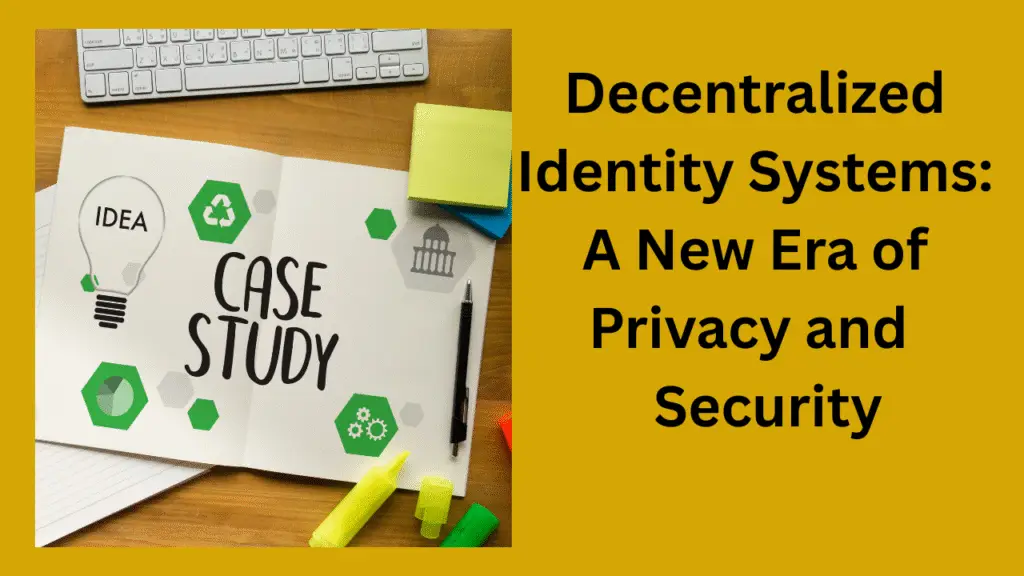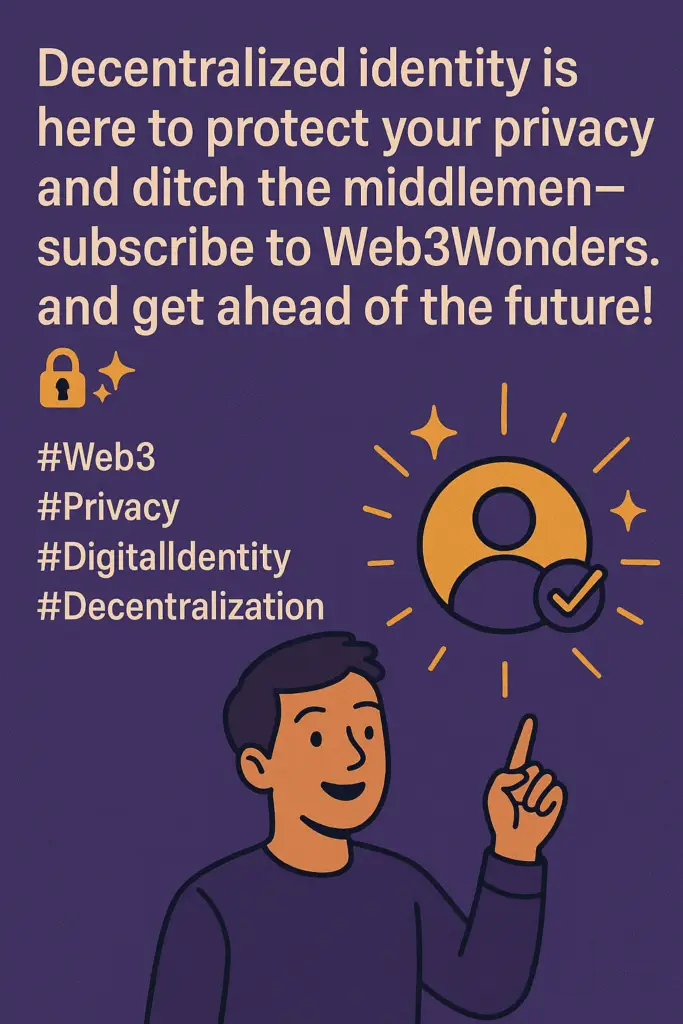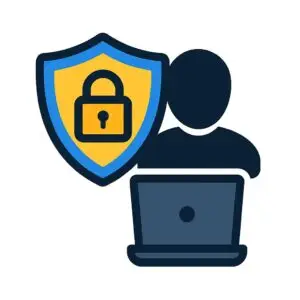Imagine a world where you control your digital identity—no third parties, no data breaches, just secure, private access to the services you need. That world is becoming a reality thanks to decentralized identity systems. Built on the foundation of blockchain technology, these systems are transforming how we manage and protect our personal information online.
In this post, we’ll break down what decentralized identity really means, why it’s such a game-changer, and how it’s setting a new standard for privacy and security in the digital era. By the time you finish reading, you’ll understand the power of this technology—and why following Web3Wonders.US is your gateway to staying ahead of the curve.
What Is Decentralized Identity?
Decentralized identity is a way of managing personal information using blockchain technology. In traditional systems, your personal data is stored by companies like banks, social media platforms, or healthcare providers. If their systems are hacked, your information could be stolen.
With decentralized identity, your information is stored on a blockchain—a secure, decentralized network. Instead of relying on companies to protect your data, you control it. You can decide who gets access and for how long.
Think of it like having a digital wallet for your personal information. You can use it to prove your identity without sharing unnecessary details, keeping your privacy intact.
Why Privacy and Security Matter
In today’s world, personal data is one of the most valuable resources. Companies use it to sell products, and hackers target it for financial gain. Unfortunately, traditional systems often fail to protect this data, leading to identity theft, fraud, and loss of privacy.
Here’s why decentralized identity is important:
1. Protecting Privacy
Decentralized identity systems allow you to share only the information that’s needed. For example, you could prove you’re over 18 without sharing your birthdate.
2. Preventing Hacks
Since your data isn’t stored in one central location, hackers can’t access everything at once. Blockchain technology uses advanced encryption to keep information safe.
3. Empowering Individuals
Decentralized identity gives you control over your personal data. You decide who gets access and for how long, empowering you to protect your privacy.
How Decentralized Identity Systems Work
Decentralized identity systems use blockchain technology and cryptographic techniques to keep your data secure. Here’s how they work:
1. Self-Sovereign Identity
This concept means that you own and control your identity. Instead of relying on third parties, you manage your data through a blockchain-based digital wallet.
2. Verifiable Credentials
When someone needs proof of your identity, you can share a verifiable credential. This is a digital certificate stored on the blockchain, ensuring it’s authentic and tamper-proof.
3. Zero-Knowledge Proofs
This technique allows you to prove something without sharing unnecessary details. For example, you could confirm you’re eligible for a loan without revealing your income.
Real-World Examples
Decentralized identity systems are already being used to make life safer and more convenient. Here are two examples:
1. Microsoft Azure AD Verifiable Credentials
Microsoft is using blockchain technology to help people verify their identity securely. Their system allows users to store and share their credentials with complete privacy, demonstrating the potential of decentralized identity.
2. ID2020 Alliance
The ID2020 Alliance is using decentralized identity systems to help people in underserved regions prove their identity. This is especially important for refugees and those without access to traditional ID systems.
Benefits of Decentralized Identity Systems
Decentralized identity systems offer several advantages over traditional systems:
Privacy: You control your information and decide who can access it.
Security: Blockchain technology protects your data from hacks and breaches.
Convenience: Digital wallets make it easy to manage and share your credentials.
Inclusivity: People who lack traditional IDs can use decentralized systems to prove their identity.
Challenges to Overcome
While decentralized identity systems are promising, there are challenges to address:
Technical Complexity Blockchain technology can be difficult to understand. Efforts are needed to make decentralized identity systems user-friendly.
- Adoption Governments and companies must adopt decentralized systems for them to become widely used.
- Regulations Clear rules are needed to ensure decentralized identity systems are secure and trustworthy.
- Why Decentralized Identity Is the Future
As more of our lives move online, the need for privacy and security will only grow. Decentralized identity systems offer a solution that puts individuals in control, empowering them to protect their personal information in a digital world.
Whether it’s accessing healthcare, applying for jobs, or proving your identity, decentralized systems ensure your data is safe and private.
Join the Privacy Revolution—Subscribe to Web3 Wonders
Decentralized identity systems are changing the way we think about privacy and security. If you’re passionate about learning how blockchain is making the world a safer place, subscribe to Web3Wonders.US.US.US today.
At Web3Wonders.US, we bring you the latest insights and innovations in blockchain technology and Web3. Whether you’re new to these topics or already an expert, our blogs and case studies will keep you informed and inspired.
Your personal data deserves better—take the first step toward a secure future by joining the Web3 revolution. 🚀




Registering for 55jlregister was a breeze. I’m talking, like, one minute, tops! Now I’m rolling! 55jlregister register na!
ABCbet1br é show! Depósitos e saques rápidos, e sempre tem promoções novas rolando. Me diverti muito por lá abcbet1br.
Kebetbet’s not bad at all, bro! Quick payouts and some decent games. Give it a shot, you might get lucky kebetbet
Quick and easy to login, and never had any issues… That is what I can say about Brazino777login as a user. Good bonuses and good game selection. Click the link to check it out for yourself brazino777login!
Dailyjililogin is really convenient. The login process is quick, and I can get straight to playing my favorite games. Super easy access at dailyjililogin.
Okay, Tai Xiu is my go-to for a quick betting fix. This site, taixiugamevn, is legit. The interface is clean, and the results feel fair. Giving it a solid thumbs up if you like rolling dice. Check out taixiugamevn – you might get hooked!
Yo, what’s up? I stumbled upon 99okclub. Seems alright. Games are pretty standard, but the interface is clean. Might be your thing! Have a look-see: 99okclub
Hey guys, anyone else using goal11? Using the goal11login and seems fairly straight forward to me. Check out the link here: goal11login
Bigballercasino is my place to be winning big money! They have a great community. Good vibes with good games bigballercasino
Goal11app, eh? Been hearing good things! Gotta check it out and see if it lives up to the hype. Maybe I’ll strike it lucky! goal11app